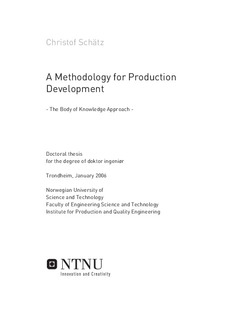| dc.description.abstract | The development of production line and facilities is without doubt a crucial task for the discrete goods producing industry in order to gain the competitive edge and the attention of the customer. This trend started already in 1969 when Skinner emphasised the strategic importance of manufacturing and that neglecting it could result in production which is time consuming and expensive. As well as this, the evolution in the manufacturing environment over recent years has resulted in the need to consider the whole product life cycle and hence the continuously shortening of the “Time to Market” period for new production facilities with ever higher quality requirements at lower costs. [Womack 1990, Pawar 1994, Case 1998, Wu 2000, Maffin 2001, Reid, 2002, Vonderembse 2003, Swift 2003]
The objective of this paper is to determine a Body of Knowledge for production development to enable small and medium sized enterprises (SME) to shorten their “Time to market” and thereby increase their profit margin. In this thesis it will be investigated how in particular each category of this Body of Knowledge will contribute to production development and how they can be merged into a generic methodology for production development. Literature revealed that there exist three different perspectives to production development which developed historically, namely the traditional and the down and upstream perspective. It could be concluded that the Body of Knowledge for the sequential traditional approaches was formed out of three categories, Production Development Process, Tools and Technology. The upstream and downstream perspectives are concurrent approaches and to date the Body of Knowledge has evolved over the years into five categories: Integrated Product Development, Multidisciplinary Teams, Project Management, Tools and Technology.
Since these categories cover more than just production development it was necessary to screen these adjoining fields for the particular contribution to production development. Finally, all the contribution could be merged into one overall production development methodology. This methodology describes the process for a systematic approach to production development which is based on the fact that it includes the complete Body of Knowledge. To adjust this methodology for the different production development projects in industry, a production development process template was integrated which enables small and medium enterprises to adapt the development process to their individual needs. The determination of such a generic methodology for production development based on its Body of Knowledge now enables now small and medium sized enterprises to approach production development generically and by that handle the development of production facilities more effective with regards to time and quality for ever more complex products. | nb_NO |
